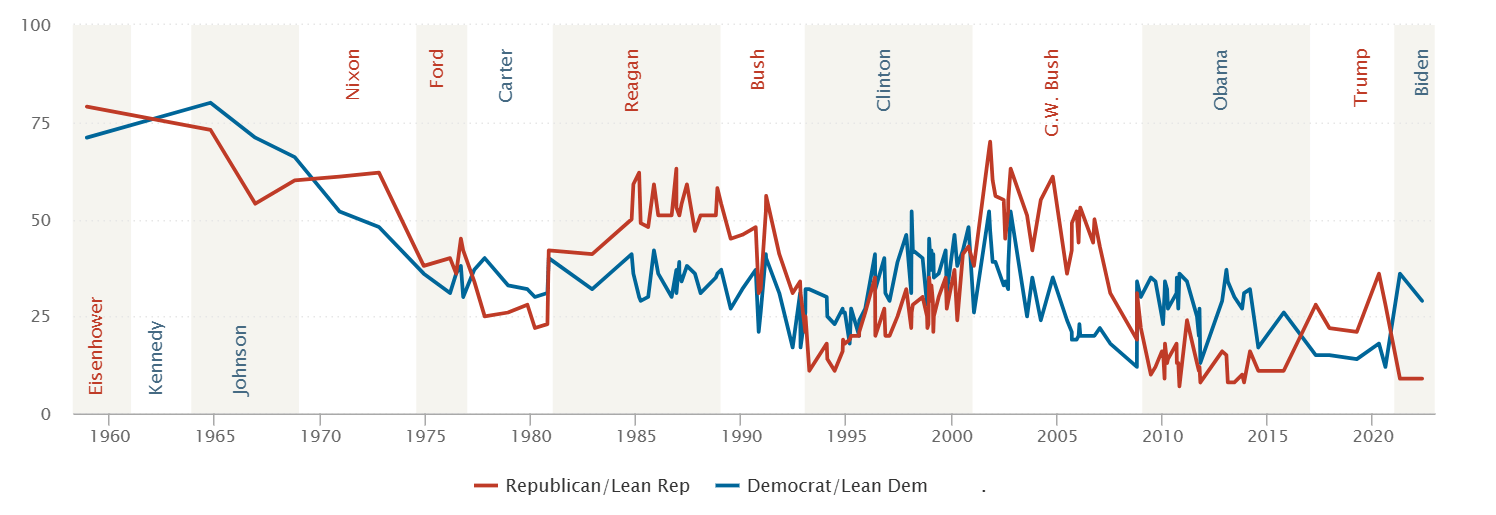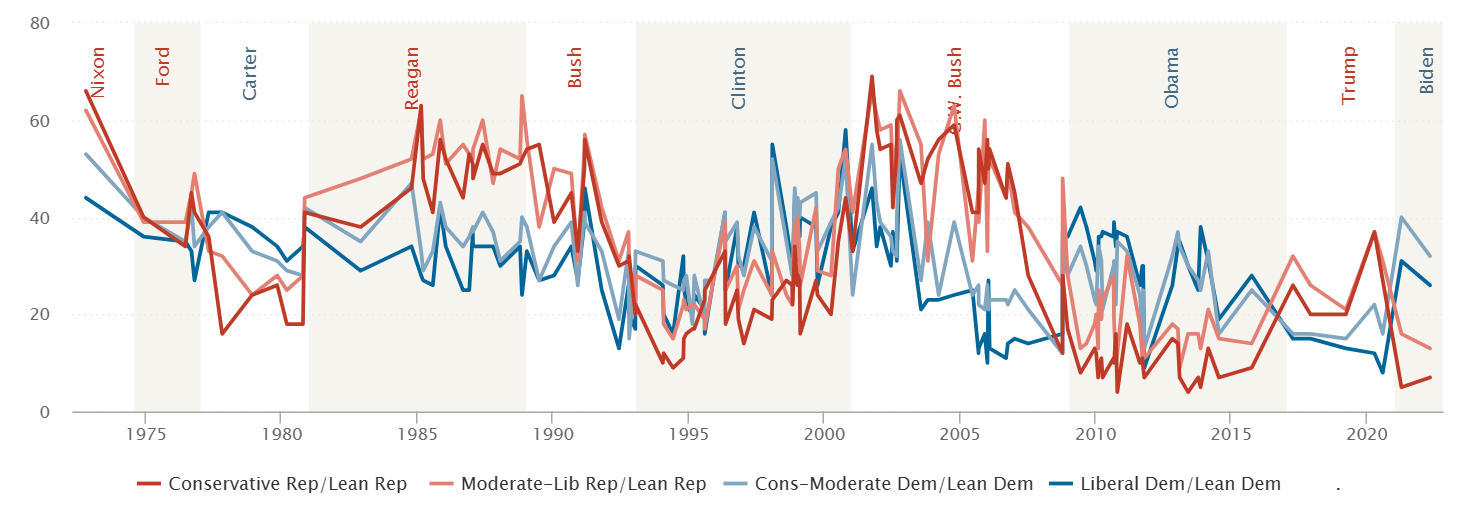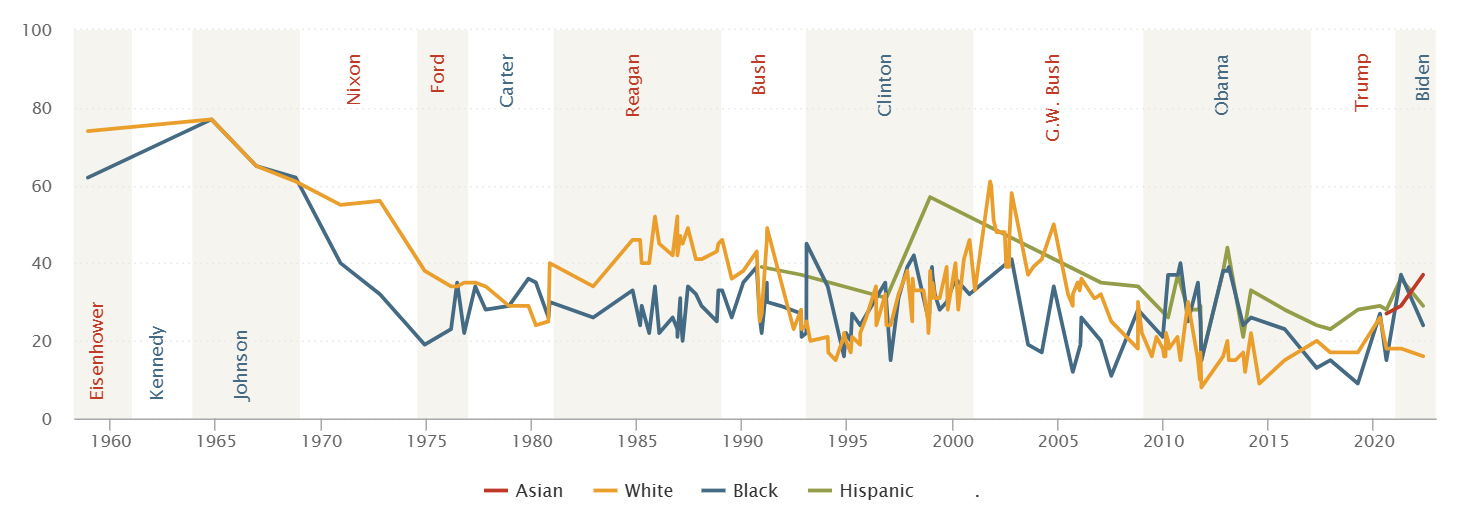With the 2024 U.S. presidential election approaching, public trust in the government is once again under the microscope. For much of the 21st century, trust has remained low, with only two-in-ten Americans saying they trust the federal government in Washington to do what is right “just about always” (2%) or “most of the time” (19%). Trust has declined even further since last year, when 24% said they could trust the government at least most of the time. This drop is significant as it adds to the conversation surrounding the upcoming election, where trust in leadership and government actions will be highly scrutinized.
Public Trust in Government Near Historic Lows
When the National Election Study began asking about trust in government in 1958, about three-quarters of Americans trusted the federal government to do the right thing almost always or most of the time. Trust in government began eroding during the 1960s, amid the escalation of the Vietnam War, and the decline continued in the 1970s with the Watergate scandal and worsening economic struggles. Confidence in government recovered in the mid-1980s before falling again in the mid-1990s. But as the economy grew in the late 1990s, so too did confidence in government. Public trust reached a three-decade high shortly after the 9/11 terrorist attacks, but declined quickly thereafter. Since 2007, the shares saying they can trust the government always or most of the time has not surpassed 30%.
Today, 29% of Democrats and Democratic-leaning independents say they trust government just about always or most of the time, compared with 9% of Republicans and Republican-leaners. Democrats report slightly less trust in the federal government today than a year ago; there has been no change in the views of Republicans.
Throughout Donald Trump’s tenure as president, more Republicans than Democrats reported trusting the government, though that has flipped since Joe Biden’s election. Since the 1970s, trust in government has been consistently higher among members of the party that controls the White House than among the opposition party. Republicans have often been more reactive than Democrats to changes in political leadership, with Republicans expressing much lower levels of trust during Democratic presidencies; Democrats’ attitudes have tended to be somewhat more consistent, regardless of which party controls the White House. However, the GOP and Democratic shifts in attitudes between the end of the Trump presidency and the early Biden administration were roughly the same magnitude.
Trust in Government Higher Among Members of Party that Controls Presidency
Trust in Government by Party and Ideology
Asian (37% trust the government “most of the time” or “just about always”), Hispanic (29%) and Black (24%) adults all express higher levels of trust in government than do White adults (16%). Black Americans’ trust in government is lower than it was a year ago, but remains higher than it was late in the Trump administration. Views among White, Hispanic and Asian adults have seen less change since 2021. As was the case throughout much of the Obama and Clinton administrations, Black and Hispanic adults now express more trust in the government to do the right thing than do White adults. Throughout much of the Republican presidencies of Ronald Reagan, George W. Bush and Trump, White Americans were substantially more likely than Black Americans to express trust in the federal government.
Trust in Government by Race and Ethnicity
Online Gambling and the Question of Trust
The ongoing decline in public trust has influenced a variety of sectors, including online casinos and other regulated industries. As more states legalize online gambling, ensuring secure and reliable digital transactions has become crucial in building trust with consumers. For instance, regulated online casinos must adhere to strict guidelines, such as fair-play assurances, data privacy protections, and transparent payment processes, to foster consumer confidence. As people become more cautious about who they trust, such accountability measures in online casinos play a vital role in reassuring users and establishing a trustworthy environment.
*Sources: Pew Research Center, National Election Studies, Gallup, ABC/Washington Post, CBS/New York Times, and CNN Polls. Data from 2020 and later come from Pew Research Center’s online American Trends Panel; prior data from telephone surveys. Question wording can be found here. See 2020 report for more details on changes in survey mode. More information on the Pew Research Center’s polling methodology can be found here. For party and race/ethnicity analysis, selected datasets obtained from searches of the iPOLL Databank provided by the Roper Center for Public Opinion Research. White, Black and Asian American adults include those who report being one race and are not Hispanic. Hispanics are of any race. Estimates for Asian adults are representative of English speakers only.







